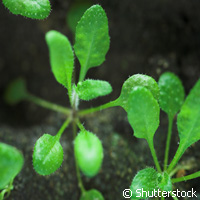Plant resistance studies target food security
Scientists in the UK are attempting to find new ways to improve crop plants and increase food security by gaining a clearer understanding of how some bacterial strains become specialised to overcome plant resistance. Presenting their findings in the journal Science, the scientists identified the genes used by some strains of the bacterium Pseudomonas to overwhelm defensive natural products produced by plants of the mustard family, or crucifers including broccoli and Brussels sprouts. 'Microbes only become pathogens when they find a way to infect a host and overwhelm the host defences,' explains lead author Dr Jun Fan from the John Innes Centre (JIC) at Norwich Research Park in the UK. 'Our findings answer some important questions about host-pathogen biology.' The researchers explain that 'non-host resistance is the ability of most plant species to resist microbes or viruses that are successful pathogens on other plants. It is the most prevalent form of plant disease resistance, is durable and effective against a broad range of potential pathogens.' But they acknowledged that their understanding of 'its molecular basis is still poor'. 'Plants generate a huge diversity of natural products, with multiple roles in defence, communication, and development,' the authors write. 'Preformed natural products provide chemical barriers to phytopathogenic fungi and are deterrents in plantherbivore interactions. Their role in restricting bacterial host range remains obscure, as do the bacterial mechanisms involved in breaching natural product - mediated host defences.' Hence, to better understand fundamental host-pathogen biology and to shed light on the development of sustainable field resistance to major crop diseases, the research team defined 'plant components conferring non-host resistance as well as strategies used by virulent pathogens to overcome resistance barriers'. After carrying out a series of experiments, Dr Fan's team confirmed that the chemicals used by cruciferous plants to defend against bacteria are isothiocyanates, nitrogen and sulphur-containing organic compounds produced by plants of the mustard family such as cabbage, broccoli and Brussels sprouts. These potent molecules have antioxidant, anticancer and anti-inflammatory properties in humans. Isothiocyanates are released by the plant when it is challenged or eaten. They had previously been shown to be active against bacteria but this is the first time their essential role has been successfully tested using real plants. Without this class of compounds, crucifers would be more vulnerable to disease from a much wider variety of bacteria. Isothiocyanates also provide a chemical barrier to harmful fungi and a toxic defence warning to insects and other herbivores. The team of scientists from JIC and the University of Edinburgh found that bacterial pathogens carrying the sax genes, thought to be involved in detoxification and removal of isothiocyanates, were able to overcome these defences. Understanding how some bacterial strains become specialised to overcome plant resistance will help scientists identify new ways to improve crop plants. 'These discoveries have a broader significance for current efforts to increase food security,' says co-author Dr Peter Doerner, lecturer at the University of Edinburgh. 'They define a strategy for sustainable disease control in agriculture by stimulating the production and variety of natural products in various crop plants.' The authors write, 'Our findings show that Pseudomonas pathogens require sax gene-dependent mechanisms to overwhelm aliphatic isothiocyanate-mediated non-host resistance in Arabidopsis.' They note that this work showed how 'non-host resistance...to specific pathogen genotypes, can be resilient, durable, and broadly effective against many potential pathogens, thereby revealing emergent principles for engineering sustainable field resistance for major crop diseases'.For more information, please visit: John Innes Centre (JIC):http://www.jic.ac.uk/corporate/index.htmScience:http://www.sciencemag.org/
Countries
United Kingdom



